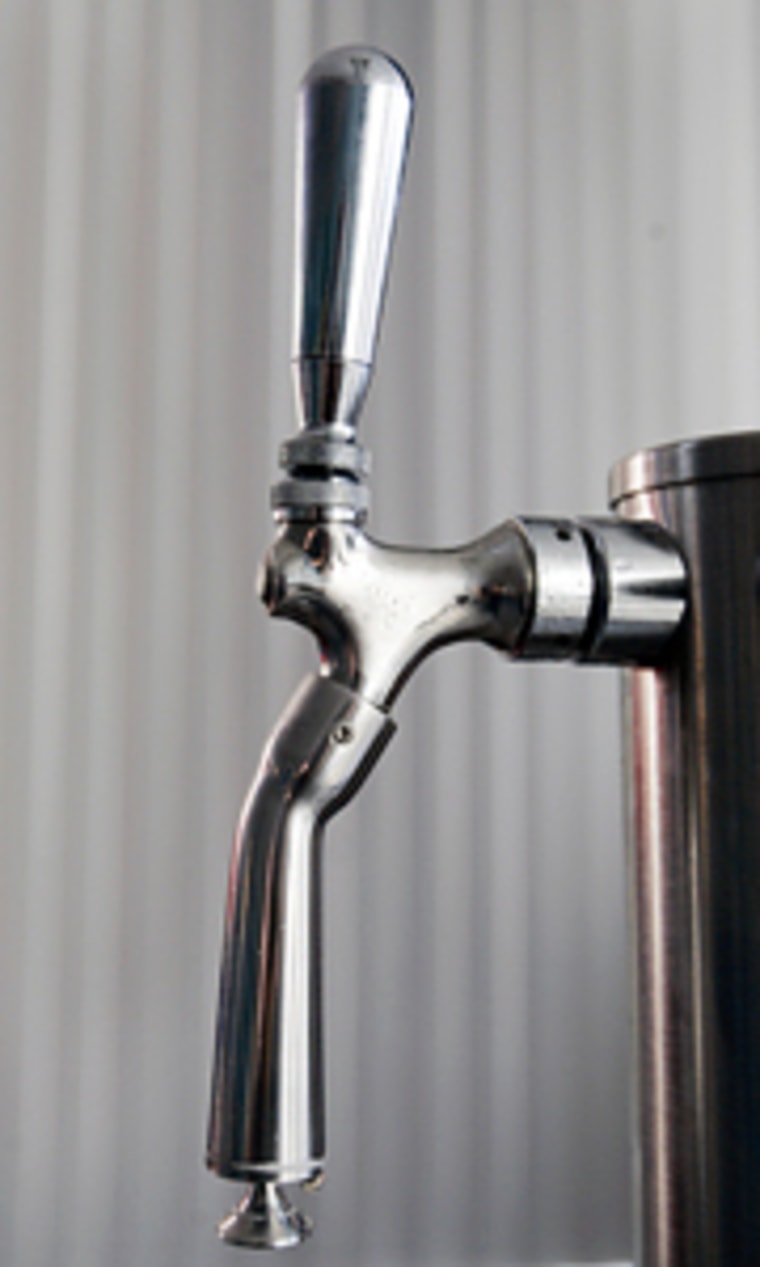The company that sped up pulls of draft beer at sports stadiums around the United States with its Turbo Tap nozzle is bringing the technology to recreation rooms across America.
Laminar Technologies LLC has outfitted six sports arenas including U.S. Cellular Field in Chicago and some 30 Chicago bars, receiving fawning media coverage. Time magazine lists the gadget as one of the coolest inventions of 2005 in an issue that hits newsstands Monday.
After all the attention, the company says hundreds of beer drinkers are clamoring to get a Turbo Tap of their own. On Monday the company will start selling home kits online for those who have drilled holes in refrigerators to make "kegerators" or bought special coolers to serve draft beer in their basements, garages and recreation rooms.
"It brings the project back to our roots," said inventor Matthew Younkle, the company's president and chief technology officer, who came up with the idea with partner Kristofer Dressler when they were students at the University of Wisconsin-Madison.
"At that point we weren't thinking about pouring beer in a concession environment," said Younkle, 32. "We were thinking about ways to pour beer faster at a party."
The Chicago-based company started sales in January and has doubled sales every month since July although it would not release those figures.
The Turbo Tap's main market will remain the big stadiums with hundreds of taps to convert, Younkle said. If home sales reached 10 percent of the total, "we would be thrilled," he said.
While home users are not concerned with better sales, they are drawn by the same attributes that attracted businesses: pints poured in about two seconds — what the company claims is up to four times faster than a normal tap — and keg yield up to 30 percent better than regular.
Because the tap smooths the pouring process, there is a regulated amount of foam, a lot of which normally goes down the drain in the quest for the perfect head. Efficient pours can mean up to 20 more beers per keg even for people who have no experience pulling beer, the company says.
Tiny wings inside the tap keep the fluid moving in a steady "laminar flow" — thus the company name — which allows beer to move more quickly through fatter tubes without causing excessive foaming. The elongated, tapered tap fills cups from the bottom, preventing gravity from taking over and causing a foamy splash.
Buyers who have set up home draft systems are already "gadget junkies" who will have no problem with the kit, said Dressler, director of product development.
"They just think it's really cool," said Dressler, who corresponds with most of the hardcore fans. "It's a new gadget. They go to the World Series and they get a beer and they can say, 'I have that very tap at home.'"
Since a pre-launch e-mail went out to supporters Nov. 2, the company has shipped about 25 a day, Younkle said. The home versions sell for $179, or $209 for the tower model, compared to stadiums, which lease the taps for about $99 each a year, plus consulting and maintenance fees.
Chris Pick, a 28-year-old systems administrator in Rowlett, Texas, bought an early prototype for a Halloween party. Unlike after other keg parties, this time some beer was left over. Foam that usually ended up on his floor or lawn became beer that went into people's cups, he said.
"It may have saved me $16 or $20 worth of beer, but it also saved my garage floor from getting messy," Pick said.
Mark Brown, a 55-year-old prototype tester in West Bend, Wisconsin, said the novelty of the device drew rave reviews at a daylight savings party.
"I had a number of people say the beer tastes better from the Turbo Tap," he said. "It just might be that it's a new thing so it's psychological more than anything else."
The product has competitors and its skeptics, however. Dispensing Systems International of Madison, Wisconsin, makes the Mega-Tap, a machine that siphons off foam in a chamber, while cooling and pressurizing the beer appropriately before pouring, also from the bottom of the cup upward. It retails for $19,000, but can be rented for as little as $25 per keg to stadium operators, the company said.
Dispensing's president, Curt Dollar, said there's more to pouring fast beers than just a tap.
"It's not going to fix the wrongs of a beer system that has problems," Dollar said, adding Mega-Tap does. "If people buy this (Turbo Tap) and just put it on their existing tap towers thinking all their wrongs are going to be corrected, they're in for a surprise."
But the company is pushing ahead. It is in talks with SABMiller PLC to provide Turbo Taps to retailers in South Africa, Younkle said.
SportService Corp., a concession operator, earned back its investment on the taps at U.S. Cellular Field because of higher keg yield, even before the White Sox began their successful baseball World Series playoff run, said the stadium's general manager Jeff Behr.
The company is now considering installing Turbo Tap at its eight other stadiums in North America, he said. "I would say it's well worth the investment."
Perlick Corp., the Milwaukee-based draft beer system maker with the largest market share in North America, is also considering offering Turbo Tap as an accessory, said co-chief executive Larry Molinari. "That's assuming that Matt wants to sell it to us," he said.
For now, Younkle said he realizes the home market is just a drop in the bucket. The company is also working on a picnic-pump version for release next spring, he said.
"What we're trying to do with the home market is just encourage people to experience good draft beer," Younkle said. "If they're experiencing it at home, they're going to want to experience it at ballparks, at bars. That's good for the industry, it's good for us."
